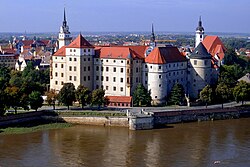Torgau
| Torgau | ||
|---|---|---|
 |
||
|
||
| Coordinates: 51°33′37″N 13°0′20″E / 51.56028°N 13.00556°ECoordinates: 51°33′37″N 13°0′20″E / 51.56028°N 13.00556°E | ||
| Country | Germany | |
| State | Saxony | |
| District | Nordsachsen | |
| Municipal assoc. | Torgau | |
| Government | ||
| • Mayor | Andrea Staude (SPD) | |
| Area | ||
| • Total | 102.53 km2 (39.59 sq mi) | |
| Population (2015-12-31) | ||
| • Total | 20,047 | |
| • Density | 200/km2 (510/sq mi) | |
| Time zone | CET/CEST (UTC+1/+2) | |
| Postal codes | 04860 | |
| Dialling codes | 03421 | |
| Vehicle registration | TDO, DZ, EB, OZ, TG, TO | |
| Website | www.torgau.de | |
Torgau is a town on the banks of the Elbe in northwestern Saxony, Germany. It is the capital of the district Nordsachsen.
Outside Germany, the town is best known as the place which commemorates the meeting of US and Soviet forces during the Second World War. This occurred on 25 April 1945, later known as Elbe Day.
Sights include the historic town centre, restored since the unification, a brewery museum, the monument for the meeting of the Russian and American troops on the Elbe and a Russian military cemetery. The early Renaissance Hartenfels castle dominates the town. The chapel was built in 1544 (designed by Nickel Gromann) and combines late Gothic with early Renaissance elements. It was consecrated by Martin Luther on 5 October 1544. Brown bears are still kept in the moat.
The settlement goes back to a Slavonic settlement named Turguo in the shire of Neletici. There was presumably a wooden Slavonic castle located on the site of the present-day Hartenstein castle. In the 10th century it fell under the rule of the Holy Roman Emperors, and a stone castle was built, round which the settlement congregated. A market is attested in 1119. The town was located on the important trade-road between Leipzig and Frankfurt an der Oder that crossed the river Elbe at a ford east of Torgau.
Torgau belonged to the duchy of Saxe-Wittenberg. After the last Ascanian duke died without issue in 1423, the Electorate passed to the Wettin dynasty, which took up its residence at Torgau. Following the Leipzig partition of the Wettin inheritance in 1485, Torgau fell to the Ernestine line. The court resided mainly in Weimar and in Torgau. From 1525 onwards, Torgau became the sole residence. After the Battle of Mühlberg in 1547, Torgau fell to the Albertine line.
...
Wikipedia



